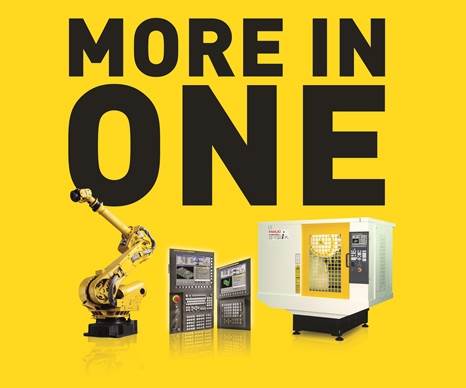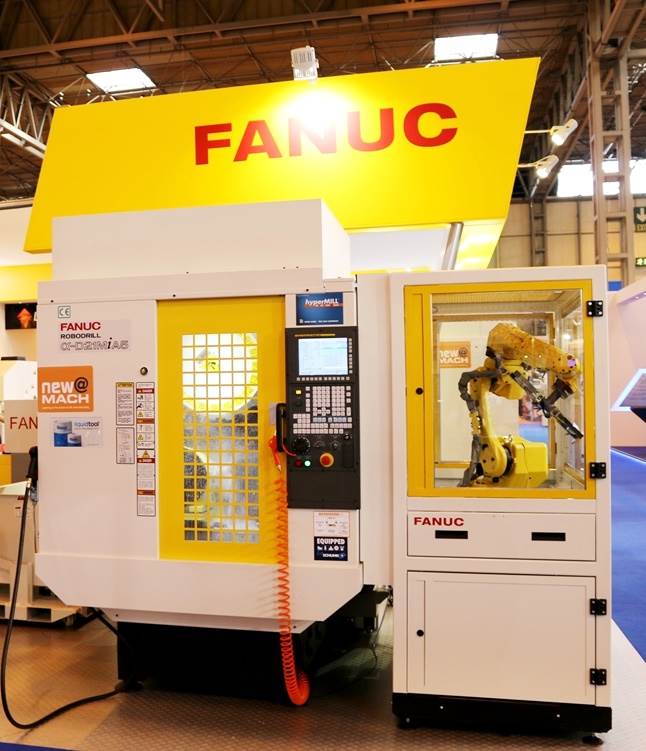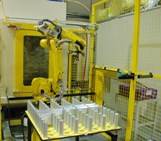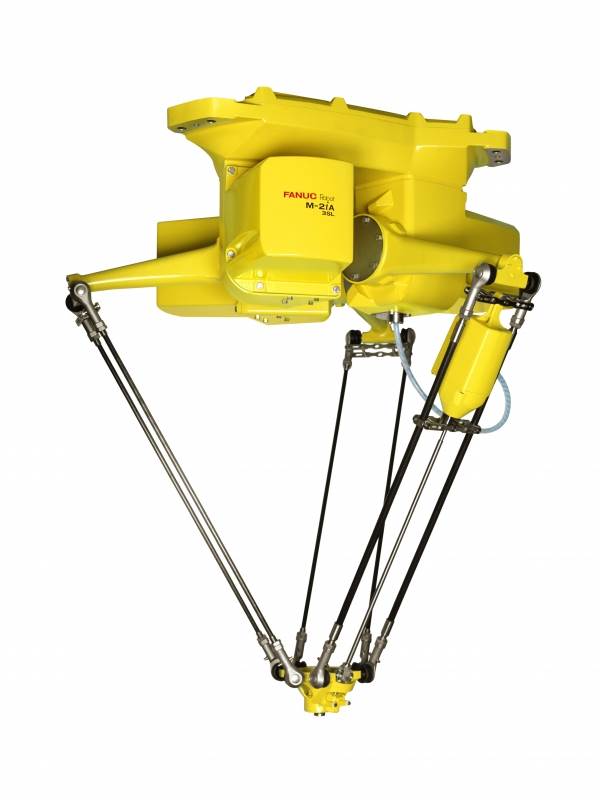- Contact 0870 350 7767
- |
- Advertise
Milking the use of robots in the dairy industry
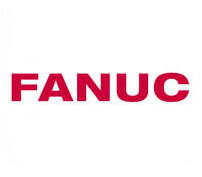 News and PR from FANUC UK Ltd - Published 11 June 2014
They have been used for some time in automatic milking sheds. Now, thanks to IP69K certifications, pick and place robots are becoming a more common sight in dairy production environments.
News and PR from FANUC UK Ltd - Published 11 June 2014
They have been used for some time in automatic milking sheds. Now, thanks to IP69K certifications, pick and place robots are becoming a more common sight in dairy production environments.Inherently, product movements in the dairy industry are less complex than other food sectors, highlights John. ÂIf you are moving a block of cheese or packs of yogurts, a simple application thatÂs easy to configure will suffice. FANUC is well-aware of the challenges and helping to plug this important gap in automation efficiency for dairy producers.
Mindful of hygiene and food safety, the FANUC LR Mate 200 Series is a popular choice for dairy manufacturers. Suitable for picking up yoghurts, butter and cheese and collating in boxes or trays, this servo-driven robot is IP67 rated as standard, with an optional upgrade to IP69K to withstand harsh pressure washing. Providing assurance to manufacturers and packers that individual Retailer Codes of Practice (COP) and the very latest hygiene and product line integrity requirements set out by the British Retail Consortium are being consistently met.
With a six axis articulated arm, John likens the LR Mate to the size and reach of a human arm. ÂIt is the most compact of all articulated arm robots, making it ideal for small cells and direct machine installations, which are common place in dairy environments. Easily capable of packing in excess of 80 packs per minute, the six-axis system can tilt, twist and rotate single or multiple products with ease. Because of this dexterity, several of the models can even place products under a lipped edge deep box. Weighing just 25kg, it can be mounted on a floor, upside down, on a wall, or at an angle.
The LR Mate range offers a low payload of between 4kg and 7kg. Manufacturers can select a short, standard and long arm, with a reach of between 550mm to 911mm. ÂGenerally speaking, the longer the reach the wider the scope of applications, says John.
Another emerging requirement is having the scope to handle a variety of pack variations. To meet this need, over 15 different end effector tools in gripper, vacuum, magnet and clam-shell style are available. Whether you are picking and packing tubs of dips, packs of butter or netted bags of cheeses, flexibility is important. ÂDairy manufacturers can select interchangeable end-effectors, which add to the flexibility. The fact that you can move a robot to a different application as production needs change is very appealing," adds John
Other announcements from FANUC UK Ltd
-
-
Fanuc and Hi-Tech to join forces at Interplas 2017
FANUC, the leading global manufacturer of factory automation solutions, is to join forces with key strategic partner Hi-Tech Automation at the Interplas 2017 event...
22 Aug 2017
-
Case Study - Eye for detail: specs start-up collaborates with FANUC
An Oxford-based start-up that specialises in affordable, adjustable eyewear has partnered with FANUC to bring its designs to market.
22 Aug 2017
-
FANUC TO SHOWCASE AUTOMATED PACKAGING SOLUTIONS AT PPMA
FANUC UK will be demonstrating the ease and affordability of automated picking, packing and palletising at this years PPMA event...
22 Aug 2017
-
FANUC Groups and Rebrands UK Operations under FANUC UK
FANUC, a world leader in the design, manufacture and supply of factory automation products, has announced the realignment of its UK divisions under one brand FANUC UK Limited.
11 Jun 2014
-
New FANUC Robodrill and Automation Cell
The FANUC Robot Cell, an automated parts handling tool and additional option to the FANUC Robodrill machine series, enables increased production while freeing up valuable manpower.
11 Jun 2014
-
NEW FANUC CNC
NEW FANUC CNC features focus on easier operation and increased energy efficiency
06 Dec 2013
-
NEW GENERATION ROBOTIC PALLETISER IS TOP OF THE CLASS
FANUC Robotics UK has launched a new universal palletising robot that boasts best-in-class speed, payload, energy-efficiency and reach.
06 Dec 2013
-
All-electric injection presses form part of £7m 'future view' investment
Owen Mumford, one of the UKs leading companies in the supply & manufacture of specialist medical devices, invested in all-electric injection moulding presses for its 'Phase 5' manufacturing facility
06 Dec 2013
-
Lights out 'Machine Team' help keep sub-contractor on top
A thriving North East manufacturer employing 'lights out' machine-shop automation has been awarded for its successful diversification into the competitive aerospace sub-contract engineering sector. Consistent investment in advanced machine tool automation, including robotics, has helped ALM Products to build a new sub-contract engineering service into a healthy 40% of turnover.
16 Jul 2013
-
New FANUC Genkotsu series robot provides fast, mid-range, line builder solution
FANUC has added a new 3kg payload parallel link robot to its high-speed Genkotsu Series. The FANUC M-2iA fills a gap between the existing 1kg and 6kg arms providing a large work envelope, with high throughput performance for mid-range assembly and handling tasks.
19 Mar 2013








